Time and place: Friday June 15th at 13:15 in K3@BIO.
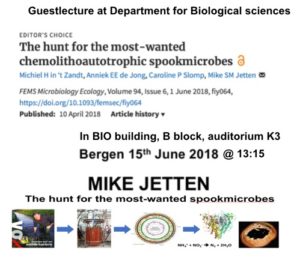
Mike Jetten and his team have provided significant discoveries about the role of anaerobic bacteria in the global nitrogen cycle (anammox) and nitrate-dependent methane oxidation.The anammox bacteria can convert nitrogen compounds into dinitrogen gas without oxygen.This process is highly beneficial to the development of sustainable waste water treatment. Anammox has therefore been implemented in sewage treatments plants worldwide.
 At the biannual President’s Meeting in ISQBP next week, Dr. Nathalie Reuter, as of July 1 Professor at the Chemistry department, will receive the Loew Lectureship Award! The International Society of Quantum Biology and Pharmacology (ISQBP) was founded by Professor Per-Olov Löwdin, who also served as the society’s first president. The eleventh President was Gilda H. Loew, in honour of whom the Loew Lectureship Award was established in 2004, and the 23rd President was this years recipient of said Award, namely Nathalie.
At the biannual President’s Meeting in ISQBP next week, Dr. Nathalie Reuter, as of July 1 Professor at the Chemistry department, will receive the Loew Lectureship Award! The International Society of Quantum Biology and Pharmacology (ISQBP) was founded by Professor Per-Olov Löwdin, who also served as the society’s first president. The eleventh President was Gilda H. Loew, in honour of whom the Loew Lectureship Award was established in 2004, and the 23rd President was this years recipient of said Award, namely Nathalie. 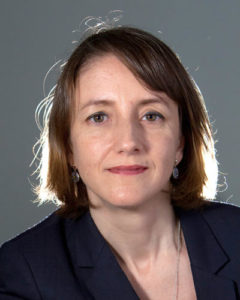 In between, the list of former ISQBP Presidents include several Nobel prize laureates and other highly regarded scientists. We congratulate Nathalie on receiving the Loew Award in recognition of her high standing in a very competitive field of research!
In between, the list of former ISQBP Presidents include several Nobel prize laureates and other highly regarded scientists. We congratulate Nathalie on receiving the Loew Award in recognition of her high standing in a very competitive field of research!
In passing, it may be noted that the referred-to Professor Löwdin is also accredited with coining the research field Quantum Chemistry. He was the supervisor of Professor Rolf Manne, who in turn established this research field in Bergen, at the Chemistry department. It does make some sense that Nathalie receives the Loew Award and joins the Chemistry department at the same time!
Oct 10 is the Norwegian research council’s application deadline for national research infrastructure platforms. Only the 165 project leaders who submitted a first-stage sketch are eligible for applying. The 165 budgets sum up to 9,5 billion kroner, while the government plans to spend 600-800 million kroner. The sketches have now been published and the important process can begin of modifying, combining, and in some cases, abandoning, projects may begin.
Our department is coordinating two proposals: High-Throughput Experimentation Facility for Parallel Synthesis, and Reaction Screening and Optimisation (contact person: Giovanni) and X-ray Diffraction Instrumentation for Biostructures, Catalytic Chemistry and Functional Materials (contact person: Karl W.). We are strongly involved in the proposed National Mass Spectrometry facility for Metal Complexes, Clusters and Nanoparticles (MS-MCCN) (coordinated UiO), National Platform for NanoSafety, and Lipidomics and Energy Metabolism Platform (both coordinated by the medical faculty, UiB).
We are hosting the NNP (National NMR platform), and experience from both the application process and the startup will prove invaluable in the work that lies ahead.
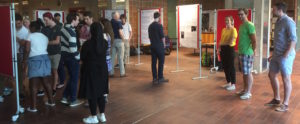 The local Nano-day was arranged today as previously announced on this channel – starting with oral presentations for the Nano100 students and finishing off with a public show of the posters that document their learning outcomes from a semester as interns in a research group.
The local Nano-day was arranged today as previously announced on this channel – starting with oral presentations for the Nano100 students and finishing off with a public show of the posters that document their learning outcomes from a semester as interns in a research group. 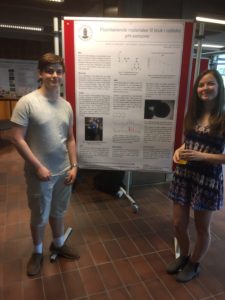 As usual, the competition for the honour as best poster in show was a close one, but with Ida and Morten as the unrivalled winning duo. Well done — to them and their fellow students!
As usual, the competition for the honour as best poster in show was a close one, but with Ida and Morten as the unrivalled winning duo. Well done — to them and their fellow students!
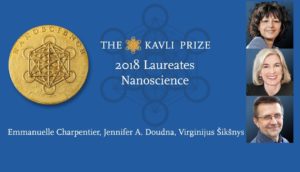 It is fitting to point out that yesterday, the winners of the 2018 Kavli Prize winners in Nanoscience were officially announced. Quoting the Kavli foundation, The Kavli Prize in Nanoscience is awarded for outstanding achievement in the science and application of the unique physical, chemical and biological properties of atomic, molecular, macromolecular and cellular structures and systems manifested in the nanometer scale. This year, the prize was awarded for the invention of CRISPR-Cas9, the revolutionary nanotool for editing DNA, shared by Emmanuelle Charpentier of the Max Planck Society, Jennifer A. Doudna of the University of California, Berkeley, and Virginijus Šikšnys of Vilnius University.
It is fitting to point out that yesterday, the winners of the 2018 Kavli Prize winners in Nanoscience were officially announced. Quoting the Kavli foundation, The Kavli Prize in Nanoscience is awarded for outstanding achievement in the science and application of the unique physical, chemical and biological properties of atomic, molecular, macromolecular and cellular structures and systems manifested in the nanometer scale. This year, the prize was awarded for the invention of CRISPR-Cas9, the revolutionary nanotool for editing DNA, shared by Emmanuelle Charpentier of the Max Planck Society, Jennifer A. Doudna of the University of California, Berkeley, and Virginijus Šikšnys of Vilnius University.
På fredag 1. juni går Nanodagen 2018 av stabelen. Dette er både eksamensdag for NANO100-studentane og ei markering av nanostudiet ved UiB. I tidsrommet 14.15 – 15.00 stiller NANO100-studentane ut posterane sine fra vårens prosjektarbeid i ein offentleg postersesjon. Dette finn stad i Vrimlearealet 1. etasje, Realfagbygget. 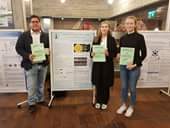 Du er hjarteleg velkomen til å møte nye og gamle nanostudentar og -veiledarar i samling rundt postarar og akkompagnert av litt sunn munngodt. Det naturlege høgdepunktet blir utdeling av årets posterpris! Dette er ein stolt tradisjon, og det opptil fleire dugande forskarar som først vekk avslørt sitt talent i denne samanhengen!
Du er hjarteleg velkomen til å møte nye og gamle nanostudentar og -veiledarar i samling rundt postarar og akkompagnert av litt sunn munngodt. Det naturlege høgdepunktet blir utdeling av årets posterpris! Dette er ein stolt tradisjon, og det opptil fleire dugande forskarar som først vekk avslørt sitt talent i denne samanhengen!
Publication statistics for 2017 has been released by the library (Universitetsbiblioteket i Bergen, 2018, Publiseringsstatistikk for UiB), and the results are quite encouraging for our department. 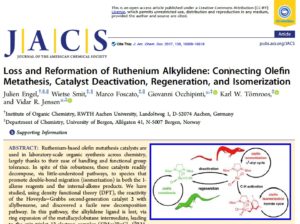 While keeping the San Fransisco declaration in mind, one is allowed to point out that we are bouncing back to one-third of our publications appearing in level-II journals, which is also the faculty average. This means breaking a three-year slide that reached a low 16% last year. The same can be said for the number of scientific papers published and also the publication points earned (62, 55 and 72 for 2015-2017). We still have a way to go, though, with 1.2 publication points per employee engaged in research (aka UFF), compared to the faculty average of 1.7 pp/UFF.
While keeping the San Fransisco declaration in mind, one is allowed to point out that we are bouncing back to one-third of our publications appearing in level-II journals, which is also the faculty average. This means breaking a three-year slide that reached a low 16% last year. The same can be said for the number of scientific papers published and also the publication points earned (62, 55 and 72 for 2015-2017). We still have a way to go, though, with 1.2 publication points per employee engaged in research (aka UFF), compared to the faculty average of 1.7 pp/UFF.
Our Dean is frequently using his blog to put local events into a wider and longer perspective — you can easily access the blog by means of the menu at the top of this page. In the most recent entry, you can read the Dean’s address to professor Leiv Sydnes, given on the occasion of the recent symposium.
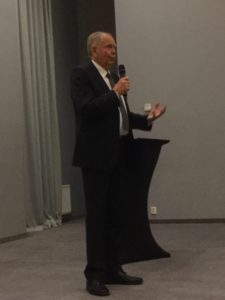 After two days filled with modern chemistry, fond memories and about 80 participants paying tribute to professor Leiv Kr. Sydnes and his many contributions to chemistry, university and society, it is easy to conclude that the symposium has been a great success. Pro-Rector Margareth Hagen set the stage in the beautiful University Aula with her inspired opening words on Tuesday, nicely followed the highly acclaimed Audun Kayser reciting four pieces of Grieg. Leiv’s first PhD graduate, professor John Sigurd Svendsen, UiT, took the audience along for a most impressive and capturing journey that combined chemistry and entrepreneurship, and from there on one inspired lecture followed after the other, until professor Magne O. Sydnes, UiS, gave the last one today, titled Chemistry in the Sydnes Laboratories.
After two days filled with modern chemistry, fond memories and about 80 participants paying tribute to professor Leiv Kr. Sydnes and his many contributions to chemistry, university and society, it is easy to conclude that the symposium has been a great success. Pro-Rector Margareth Hagen set the stage in the beautiful University Aula with her inspired opening words on Tuesday, nicely followed the highly acclaimed Audun Kayser reciting four pieces of Grieg. Leiv’s first PhD graduate, professor John Sigurd Svendsen, UiT, took the audience along for a most impressive and capturing journey that combined chemistry and entrepreneurship, and from there on one inspired lecture followed after the other, until professor Magne O. Sydnes, UiS, gave the last one today, titled Chemistry in the Sydnes Laboratories. 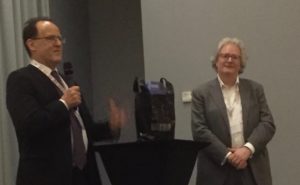 Somewhere in the middle there was a very nice evening dinner, with speeches held and presents given, by profs. Yngve Stenstrøm, Trond Vidar Hansen, the fore-mentioned pro-rector, our dean, and quite a few others. The event was very well initiated and organised, thanks due to Hans-René Bjørsvik, Bengt Erik Haug, Bjarte Holmelid, Ole Heine Kvernenes, Marit Kristin Leiren and Stig Valdernes.
Somewhere in the middle there was a very nice evening dinner, with speeches held and presents given, by profs. Yngve Stenstrøm, Trond Vidar Hansen, the fore-mentioned pro-rector, our dean, and quite a few others. The event was very well initiated and organised, thanks due to Hans-René Bjørsvik, Bengt Erik Haug, Bjarte Holmelid, Ole Heine Kvernenes, Marit Kristin Leiren and Stig Valdernes.
Ansatte og ledere ved UiB ønskes velkommen til frokostseminar 31. mai.
Vernetjenesten ved UiB ønsker å skape en arena ved UiB der vi kan ta opp betydningen av arbeidsmiljø. Vi vil invitere til frokostseminarer for å snakke om arbeidsliv og arbeidsmiljø under endring og omstilling. Målgruppen er alle ansatte og ledere.
Det første frokostseminaret arrangeres torsdag 31. mai kl. 0830-1000 i nytt odontologibygg, Årstadveien 19, 1. og 2. molar. Temaet er *Fleksibel – digital – fremtidsrettet * – Hvordan tar vi vare på arbeidsmiljøet i et mer effektivt, fleksibelt og digitalt arbeidsliv? Et godt arbeidsmiljø kjennetegnes av god ledelse, medvirkning fra ansatte og tydelige organisatoriske rammer. Kompetanse, mestring og anerkjennelse gir både trygghet og trivsel. Dørene åpner kl. 0800 og frokost serveres fra kl. 0815.
Påmelding innen 23. mai her https://skjemaker.app.uib.no/view.php?id=5006704
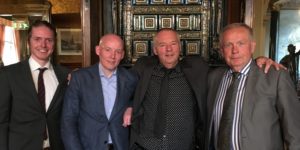 Norsk Kjemisk Selskap – NKS- har som formål «å virke for kjemiens fremme i samfunn, vitenskap, teknikk og undervisning, samt å representere norske kjemikere og ivareta deres faglige interesser». Verksemda blir leia av Hovudstyret, men det er Rådet som har øvste mynde. Det årlege rådsmøtet er dermed den avgjerande instansen i NKS, og for 2018 fann dette stad sist fredag. Bergen og UiB var godt representert ved Camilla Løhre samt firkløveret på biletet: Audun, Bengt Erik, Olav og Leiv Kr.
Norsk Kjemisk Selskap – NKS- har som formål «å virke for kjemiens fremme i samfunn, vitenskap, teknikk og undervisning, samt å representere norske kjemikere og ivareta deres faglige interesser». Verksemda blir leia av Hovudstyret, men det er Rådet som har øvste mynde. Det årlege rådsmøtet er dermed den avgjerande instansen i NKS, og for 2018 fann dette stad sist fredag. Bergen og UiB var godt representert ved Camilla Løhre samt firkløveret på biletet: Audun, Bengt Erik, Olav og Leiv Kr.
NKS var ei drivande kraft i markeringa av det internasjonale kjemiåret i 2011, og vi ser fram til ei tilsvarande synleggjering av kjemifaget i samband med feiringa av det internasjonale året for periodesystemet, 2019, 150 år etter at Dmitrij Mendelejev konstruerte det første periodesystemet. Vi siterer IUPAC: In proclaiming an International Year focusing on the Periodic Table of Chemical Elements and its applications, the United Nations has recognized the importance of raising global awareness of how chemistry promotes sustainable development and provides solutions to global challenges in energy, education, agriculture and health. Dette er ein lissepasning til NKS i deira arbeid for kjemiens fremme i samfunn, vitenskap, teknikk og undervisning.

 In between, the list of former ISQBP Presidents include several Nobel prize laureates and other highly regarded scientists. We congratulate Nathalie on receiving the Loew Award in recognition of her high standing in a very competitive field of research!
In between, the list of former ISQBP Presidents include several Nobel prize laureates and other highly regarded scientists. We congratulate Nathalie on receiving the Loew Award in recognition of her high standing in a very competitive field of research! The local Nano-day was arranged today as previously announced on this channel – starting with oral presentations for the Nano100 students and finishing off with a public show of the posters that document their learning outcomes from a semester as interns in a research group.
The local Nano-day was arranged today as previously announced on this channel – starting with oral presentations for the Nano100 students and finishing off with a public show of the posters that document their learning outcomes from a semester as interns in a research group.  As usual, the competition for the honour as
As usual, the competition for the honour as  It is fitting to point out that yesterday, the winners of the 2018 Kavli Prize winners in Nanoscience were officially
It is fitting to point out that yesterday, the winners of the 2018 Kavli Prize winners in Nanoscience were officially  Du er hjarteleg velkomen til å møte nye og gamle nanostudentar og -veiledarar i samling rundt postarar og akkompagnert av litt sunn munngodt. Det naturlege høgdepunktet blir utdeling av årets posterpris! Dette er ein stolt tradisjon, og det opptil fleire
Du er hjarteleg velkomen til å møte nye og gamle nanostudentar og -veiledarar i samling rundt postarar og akkompagnert av litt sunn munngodt. Det naturlege høgdepunktet blir utdeling av årets posterpris! Dette er ein stolt tradisjon, og det opptil fleire  While keeping the San Fransisco
While keeping the San Fransisco  After two days filled with modern chemistry, fond memories and about 80 participants paying tribute to professor Leiv Kr. Sydnes and his many contributions to chemistry, university and society, it is easy to conclude that the symposium has been a great success. Pro-Rector Margareth Hagen set the stage in the beautiful University Aula with her inspired opening words on Tuesday, nicely followed the highly acclaimed Audun Kayser reciting four pieces of Grieg. Leiv’s first PhD graduate, professor John Sigurd Svendsen, UiT, took the audience along for a most impressive and capturing journey that combined chemistry and entrepreneurship, and from there on one inspired lecture followed after the other, until professor Magne O. Sydnes, UiS, gave the last one today, titled Chemistry in the Sydnes Laboratories.
After two days filled with modern chemistry, fond memories and about 80 participants paying tribute to professor Leiv Kr. Sydnes and his many contributions to chemistry, university and society, it is easy to conclude that the symposium has been a great success. Pro-Rector Margareth Hagen set the stage in the beautiful University Aula with her inspired opening words on Tuesday, nicely followed the highly acclaimed Audun Kayser reciting four pieces of Grieg. Leiv’s first PhD graduate, professor John Sigurd Svendsen, UiT, took the audience along for a most impressive and capturing journey that combined chemistry and entrepreneurship, and from there on one inspired lecture followed after the other, until professor Magne O. Sydnes, UiS, gave the last one today, titled Chemistry in the Sydnes Laboratories.  Somewhere in the middle there was a very nice evening dinner, with speeches held and presents given, by profs. Yngve Stenstrøm, Trond Vidar Hansen, the fore-mentioned pro-rector, our dean, and quite a few others. The event was very well initiated and organised, thanks due to Hans-René Bjørsvik, Bengt Erik Haug, Bjarte Holmelid, Ole Heine Kvernenes, Marit Kristin Leiren and Stig Valdernes.
Somewhere in the middle there was a very nice evening dinner, with speeches held and presents given, by profs. Yngve Stenstrøm, Trond Vidar Hansen, the fore-mentioned pro-rector, our dean, and quite a few others. The event was very well initiated and organised, thanks due to Hans-René Bjørsvik, Bengt Erik Haug, Bjarte Holmelid, Ole Heine Kvernenes, Marit Kristin Leiren and Stig Valdernes. Norsk Kjemisk Selskap – NKS- har som formål «å virke for kjemiens fremme i samfunn, vitenskap, teknikk og undervisning, samt å representere norske kjemikere og ivareta deres faglige interesser». Verksemda blir leia av Hovudstyret, men det er Rådet som har øvste mynde. Det årlege rådsmøtet er dermed den avgjerande instansen i NKS, og for 2018 fann dette stad sist fredag. Bergen og UiB var godt representert ved Camilla Løhre samt firkløveret på biletet: Audun, Bengt Erik, Olav og Leiv Kr.
Norsk Kjemisk Selskap – NKS- har som formål «å virke for kjemiens fremme i samfunn, vitenskap, teknikk og undervisning, samt å representere norske kjemikere og ivareta deres faglige interesser». Verksemda blir leia av Hovudstyret, men det er Rådet som har øvste mynde. Det årlege rådsmøtet er dermed den avgjerande instansen i NKS, og for 2018 fann dette stad sist fredag. Bergen og UiB var godt representert ved Camilla Løhre samt firkløveret på biletet: Audun, Bengt Erik, Olav og Leiv Kr.